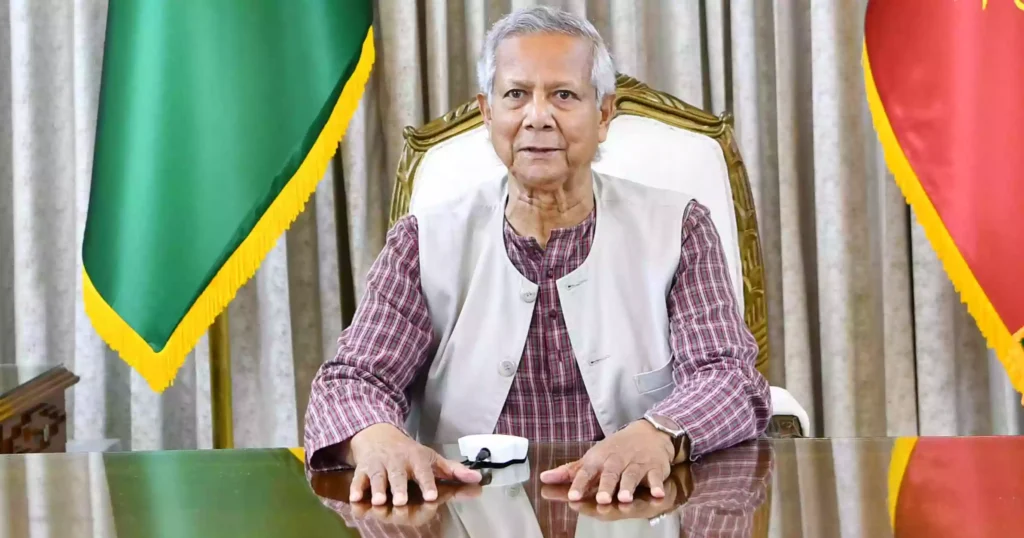In a move laced with theatre and calculation, Mohammed Yunus recently threatened to resign. It was a dramatic gesture not of departure, but domination of a politically aimed at deepening uncertainty. By projecting strength through chaos, Yunus sent a clear message to allies in Beijing and Islamabad: his grip on Dhaka remains firm, regardless of public sentiment.
A Quiet but Dangerous Shift
In just a few months, Bangladesh’s political course has swerved sharply. The technocratic caretaker government led by Nobel laureate Muhammad Yunus has extended its mandate far beyond constitutional limits. Elections have been postponed under vague promises of “reform” and “consensus.” What appears to be a bureaucratic transition is actually a calculated pause in democratic governance — a pause that has won the enthusiastic support of both China and Pakistan.
Yunus, insulated from electoral accountability, has opened a door for strategic foreign influence. Authoritarian regimes like China and Pakistan, both wary of vibrant democracies, see an opportunity to reshape South Asia’s political map with Bangladesh as a pivotal player.
China’s Quiet Coup: Predictability Over Polls
For China, Yunus offers a unique geostrategic advantage. Free from the constraints of public opinion or parliamentary oversight, he embodies the kind of leadership Beijing prefers — consistent, unaccountable, and cooperative. Bangladesh sits on the northeastern rim of the Bay of Bengal, a strategic location for China’s Belt and Road Initiative. Beijing has already invested in ports, energy grids, railways, and industrial parks across the country.
What troubles China most is democracy. Elections create uncertainty, empower dissent, and invite scrutiny of backroom deals. Yunus, operating outside the electoral calendar, ensures none of that happens. His decisions are swift, opaque, and free of public debate exactly the formula China favours.
Chinese officials have made their approval clear. In both diplomatic visits and backchannel communications, they have praised Bangladesh’s “stable governance” a not-so-subtle endorsement of delayed elections and the technocratic facade being maintained in Dhaka.
Pakistan’s Opportunity: The Return of Jamaat
While China’s goals are economic, Pakistan’s are ideological. For more than a decade, Prime Minister Sheikh Hasina maintained a secular, India-aligned stance, cracking down on Islamist extremism and sidelining Pakistan-linked actors like Jamaat-e-Islami. That landscape is rapidly changing.
With Yunus at the helm, Jamaat and other Islamist forces are re-emerging. Banned clerics are being released. Extremist networks are reactivating. The interim government shows little interest in upholding the secular principles enshrined in the 1972 Constitution. Pakistan’s ISI, long involved in destabilising India-friendly regimes, seems to be gaining new ground in Bangladesh’s evolving power structure.
When Yunus failed to mention Pakistan’s role in the 1971 war during his December 16 remarks, it wasn’t just an omission. It was a signal. He ignored India’s contribution to Bangladesh’s liberation and reframed history to attack Hasina’s legacy — a shift in narrative that aligns with Islamabad’s longstanding revisionist agenda.
The Jamaat Resurgence and a Tilt Toward Islamism
The revival of Jamaat is not a fringe phenomenon — it’s becoming institutional. The group’s student wing, Islamic Chhatra Shibir, was active in anti-Hasina mobilizations during her final months in office. Since then, Jamaat-linked figures have entered policy circles and taken part in key electoral and constitutional review committees.
Terror-linked groups like Hizb ut-Tahrir are operating with minimal interference. Clerics once associated with Al-Qaeda-affiliated Ansarullah Bangla Team are reappearing in public life. The judiciary, too, appears to be shifting, with arrests and rulings increasingly favoring Islamist narratives. Minority voices and secular critics of Yunus now report heightened surveillance and legal intimidation.
India’s Quiet Alarm
India, once a strategic partner of the Hasina government, has been pushed to the sidelines. Calls from New Delhi for a return to democratic norms have gone unanswered. Yunus has subtly criticized India’s regional influence, and his government is attempting to rewrite the country’s liberation history, downplaying India’s critical role in 1971.
Security experts in India are increasingly concerned that Bangladesh could once again serve as a base for anti-India operations. Pakistan’s old playbook — destabilizing India through cross-border terror — finds new relevance under a permissive regime in Dhaka.
So far, India’s response has been cautious: some commercial restrictions, tightened visa protocols, and diplomatic coolness. But strategic circles in New Delhi are actively debating the need for a firmer stance.
The Realignment Underway
What’s unfolding in Bangladesh is not just a domestic political crisis and it’s a regional recalibration. China secures a compliant partner on the Bay of Bengal. Pakistan regains ideological leverage in Dhaka. Islamists find legitimacy through the backdoor. And Yunus, shielded by his technocratic image, serves as the frontman for an increasingly autocratic and externally influenced regime.
Waker-Uz-Zaman, Chief of Army Staff of Bangladesh, recently warned against any notion of a “bloody corridor” being used to destabilize the region. He reiterated the need for elections to be held in December, affirming that the future must be determined by an elected government, not by an unelected administration.
The longer this situation persists, the more Bangladesh drifts away from its democratic foundation. A secular parliamentary democracy is slowly morphing into a soft autocracy — foreign-guided, ideologically tilted, and lacking public mandate.
For South Asia, and for those who still believe in Bangladesh’s democratic promise, the time to act is narrowing fast.

